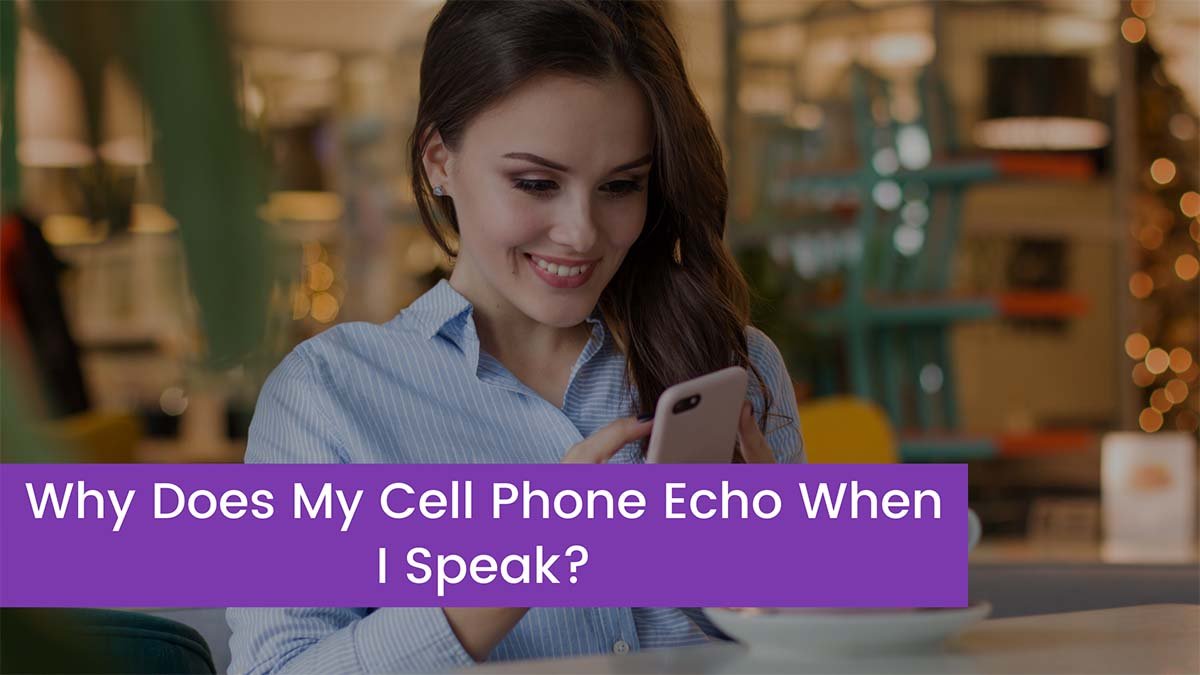Do you ever speak on your cell phone and it echoes? You’re not alone. Many people experience this issue. But what’s the reason behind it? And is there a way to fix it? In this blog post, we’ll explore the causes of cell phone echo and offer some solutions. Stay tuned!
In a phone call, echoing makes it difficult to comprehend another person’s voice, and it can also confuse a speaker who hears herself on the other end of the line. The issue is the time delay between the outbound call stream’s spoken word and its reflection in the return stream. Jitter and delay are just as ubiquitous in audio as they are in the video.
When a latency exceeds 55 milliseconds, users become extremely irritated and distracted. It’s practically impossible to carry on a conversation at this stage. The echo of their own voice will essentially break down the call for a normal user by disturbing their mental process.
An echo on the phone could be caused by a variety of factors. Acoustic feedback from the other party’s phone, a poor internet connection, a malfunctioning headset, or a damaged ethernet cable are all possible culprits.
Phone echoing has a variety of symptoms that can be used to identify it. Callers may, for example, hear their own voice through their own gadget. On occasion, there will be a call delay. In other cases, it will sound as if two parties are conversing over each other.
Echoing isn’t limited to one-on-one conversations. Conference calls and video conferencing can also be affected. For example, you could be on a conference call with 20 individuals and just one of them is experiencing phone echoing due to a technical issue. An echo will be heard by everyone else on the conference call.
4 Reasons for Phone Echo and How to fix It
One of the most common causes of phone echo is hardware faults. While some issues can be resolved by tweaking call settings, doing a short reboot, or performing a factory reset, others require more in-depth investigation:
Speakerphone
The most prevalent type of phone echoing occurs when the caller’s voice travels via the recipient’s speakers before returning through the microphone. To put it another way, one user’s voice travels through the phone system to the other party, the speaker on their phone plays the sound, the microphone on their phone takes up the sound, and it is communicated back to the first phone as an echo.
This is a typical occurrence on cell phones, whether they are iPhones, Android phones, or Samsung Galaxy phones. To correct this, have the person who isn’t hearing an echo on their phone turn down the microphone or speaker level, then retest the line for echoing.
Test for an echo problem on the phone with a handset if you’re using a call center headset or headphones. If the handset does not have an echo, the headset will most likely need to be changed. Some headsets feature options for adjusting or preventing line echo.
Slow Internet
VoIP devices require a 0.1 Mbps upload and download speed. Computers and linked devices, such as wirelessly connected cell phones, printers, and other devices, require a 0.3 Mbps upload and download speed. Jitter must be between 15 and 20 milliseconds, and packet loss must be 0%.
There will be a lag in speech transmission if your internet connection lacks certain capabilities, causing your audio to echo. Despite the fact that certain systems include echo cancellation, most mobile phones, and corded earpieces might still have echo issues.
Run a speed test to ensure you have enough bandwidth to handle VoIP conversations. Unfortunately, there is nothing you can do if the person on the other end of the line has a bad internet connection. Slow internet, on the other hand, is becoming less of an issue.
Electromagnetic Interference
Electromagnetic interference is another cause of phone echo. This commonly occurs when a wireless or landline VoIP device is placed too close to other electronic devices, such as on top of a computer against the back of a monitor, or even next to a power strip.
These gadgets, in particular, contain enormous electrical fields that could cause VoIP phones to malfunction. Electromagnetic currents can also be generated by other devices. A good rule of thumb is to keep your VoIP phone as far away from other devices as possible.
Poor quality splitters improperly configured SD-WAN or MPLS, and other equipment positioned between the VoIP device and the analog adaptor can all contribute to these problems.
Damaged Equipment
Wall jacks that are defective or broken, as well as ethernet, power, or handset cords that are damaged, can cause your phone call to echo. Poor wiring can also be a source of issues.
Long stretches of untwisted cabling, wet or broken cabling, and improperly terminated wires, for example, can all contribute to such issues. Replace each cable and retest, plugging into a different Ethernet wall connector if you suspect a cable is a problem. Replace the faulty cabling or wall jack if the problem goes away. Even the best IP phones won’t provide the service you require if they aren’t connected properly.
Conclusion
We conclude the above article by saying that listening to your own voice, especially during business meetings, is not a pleasant experience. We hope this article has answered your questions about why my voice echoes and how to fix a voice problem. Always make sure you choose the best business VoIP services so you never have to deal with network issues again.




